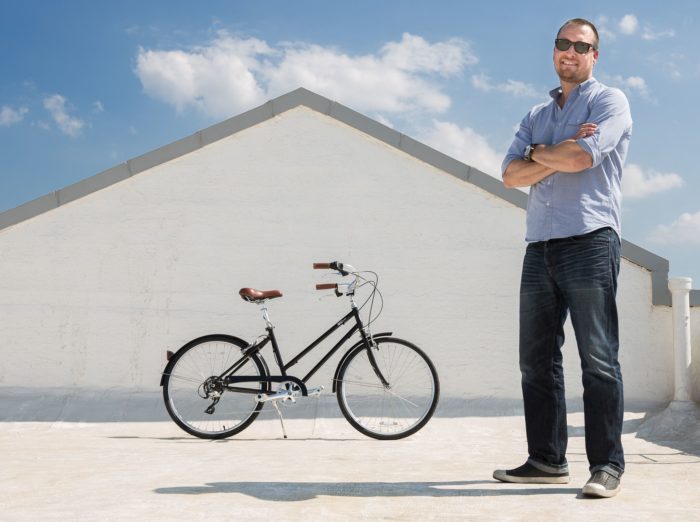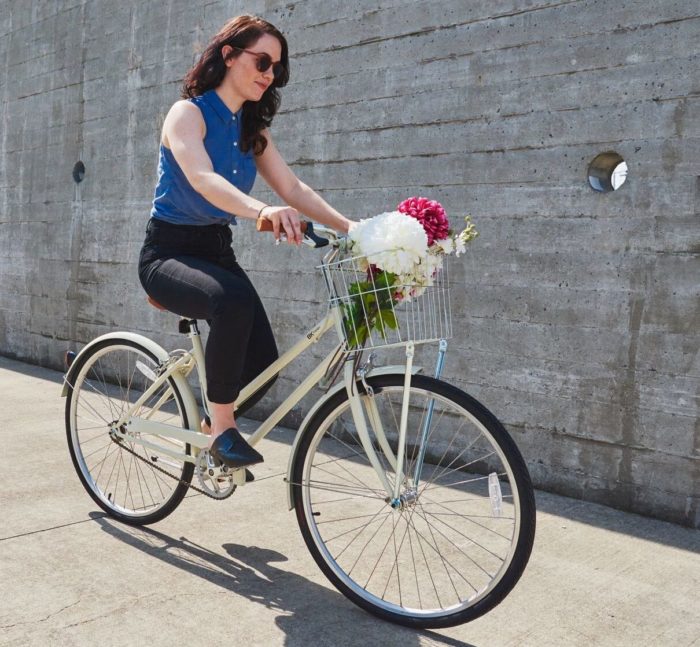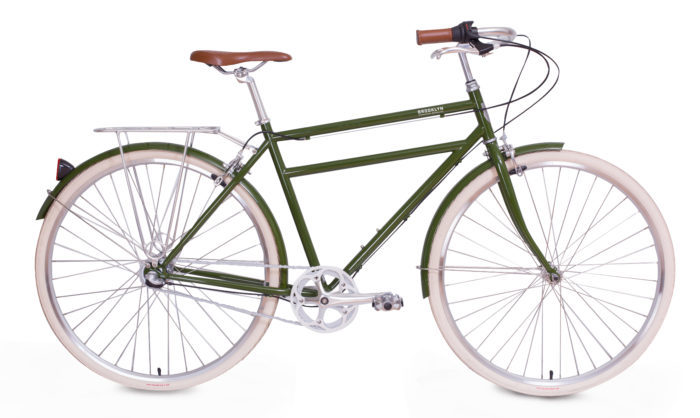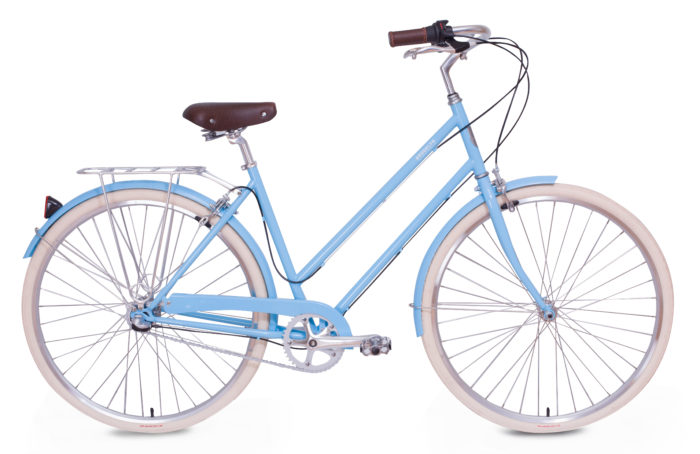How to Build a Bicycle Company in 12 Easy Lessons
Getting rolling was a challenge, but after five years in business, this Brooklyn entrepreneur has learned a thing or two about steering a startup
Ryan Zagata, president of Brooklyn Bicycle Co. (Photos courtesy of Brooklyn Bicycle, except where noted)
“I never was, nor do I profess to be, a bike enthusiast.”
Oh, but how things change when you move to Brooklyn! That’s straight from the mouth of Ryan Zagata, president of Brooklyn Bicycle Co., which sells, of course, bikes. Enthusiasms change, and perhaps transform even quicker in a new environment. Zagata was working in the finance and tech worlds in Manhattan until 2008. But one move over the river later and “the neighborhood very quickly threw its arms around us,” he says. To explore beyond his immediate radius in Williamsburg and Greenpoint, he and his wife set off on their bikes, but it wasn’t until a 2011 trip to Vietnam that the seed for a business was born.
“We saw everyone riding these upright, very utilitarian bikes, the kind of bike I had always been dreaming of but wasn’t able to find,” he says. “I don’t want to pretend that we invented or we were the first to market that type of bike, because we certainly weren’t, but it wasn’t in my wheelhouse,” he says. Before they even returned from Vietnam, he got on the phone with Worksman Cycles, based in Queens, to talk prototypes. (They designed the originals; now the bikes are designed in Brooklyn and manufactured in China and Taiwan.) Zagata stuck around his day job in software sales before going all in on the bike business in March 2012.
Sold in 12 shops in the first year, they’re now available in 150 locations in the U.S. and globally, with distributors in Argentina, France, and hopefully soon, Mexico. Every one of the 10 models is named for Brooklyn streets (Lorimer, Calyer, and so on), with prices starting at $299, with the average riding in around $599. This spring marks the five-year anniversary of the business and, as they say, business is good. Zagata shared more of his journey and lessons he’s learned along the way.
Iterate Early, Iterate Often
Despite appreciating the idea of a Brooklyn-designed bike, every single bike shop rejected Brooklyn Bike Co.’s early models—originally called Brooklyn Cruisers—in August 2011. Instead of being discouraged, Zagata went to the drawing board. Discriminating shops wanted double-wall, not single-wall rims. They wanted more aluminum and less steel (the latter tends to rust), hand brakes instead of coaster brakes. After the models were improved, they were accepted into six shops by spring 2012. Developing the models and manufacturing process involved many trips to Taiwan and China to find reputable manufacturers with strong quality control who wanted to work with a fledgling company. “As we’ve grown, we’ve been able to do business with bigger factories who are putting out better-quality products,” he says.

Brooklyn Bicycles are made with urban commuting in mind, featuring chain guards and fenders
Define Your Expectations
“One of the things I wish I had done, and what I’d tell anyone who’s launching a business, is to write down your expectations before you start. Because when you exceed them and you look back, if you don’t have anything to compare them to, you’re never going to be happy.” Zagata only realized how good business was when his insurance policy came up for renewal and he had to take a closer look at his revenue. It was double what they had projected. “Here I am thinking nothing was going well and we’re not growing fast enough,” he says. “That really allowed me to have perspective.”
Figure Out Your Pitch
Brooklyn Bicycle Co. seems like the rare company to know exactly who they serve—and that’s not by accident. When Zagata was starting the company, his wife Thea, who’s a publicist, told him there’s a thousand bike companies and a new one isn’t newsworthy. So they worked on formulating a product that was attractive, well-designed, and had a story behind the brand. Zagata points to early coverage in Brooklyn Based that led to mentions in GQ, Vanity Fair, Maxim, and other national outlets. The Museum of Modern Art even reached out to do a collaboration, resulting in a custom-colored bike sold exclusively in the MoMA gift shop.

The Driggs 3 model in army green
Make New Product
Despite their success, Zagata isn’t precious about his line-up, and they continue to release new models. Some of the most popular sellers are step-through bikes like the Willow 3 and the Franklin. They’ve also recently released a top-selling hybrid bike, the Roebling, which Bicycling magazine named one of the six top city bikes of 2017, a nice nod from experts in the industry. In about a month they’re releasing a seven-speed cruiser ideal for moseying around places like Coney Island and Brighton Beach, and are also exploring new collaborations with well-known designers.
Keep Your Staff Lean
The operation is small but mighty, with three full-time employees, including Zagata, housed in Greenpoint’s co-working space The Pencil Factory, their third home since 2012, and a clutch of part-time consultants, salespeople, and graphic designers. Maintaining relationships is a huge part of their growth. Zagata points out that one of their dealers who sold their bicycles in Greenpoint from the beginning moved with his wife to Shanghai and is now consulting for Brooklyn Bicycle, designing new products and visiting factories. “He’s been our eyes and ears to design and enhance our product portfolio,” says Zagata.
Embrace Collaboration
Like many other Brooklyn-based entrepreneurs, Zagata says he feels kinship and collaboration with other entrepreneurs in the borough, who look for ways to help one another, whether it’s carrying their tote bags and swag in stores or assisting with word of mouth: “I always say, and this may not be accurate, but had our business started in Manhattan, I think there’s a little bit more of a cutthroat element in the city, and I don’t know that people would have been as welcoming or open as they have been in Brooklyn.”
Pay Attention to What You Can Control
One unavoidable truth about the bike business: it’s seasonal. Brooklyn Bicycle Co. does 65% to 70% of its business between April and July. To cope, they are focusing on growing their dealer base in warm-weather states like Florida and Texas. “We don’t need to be a $100 million business,” he says, noting that they’ve been 100% self-funded. “I prefer to grow slow and let the market dictate where we go.”
But Don’t Forget About the Competition
Since the launch, the online bike business has boomed with an influx of what Zagata says are “very cheap, arguably dangerous bicycles” that have flooded the online market. “In any industry the barrier to entry continues to get lower and lower and lower,” says Zagata, who notes that now anyone with $30,000 can order a container of bikes from China, design a cool logo, and start selling. And while those bikes might photograph well, they’re likely subpar, with single-wall rims, copper piping frames, and non-stainless steel components.
Brooklyn Bicycle often fields calls from people who get burned by a cheap online brand. While you can also buy Brooklyn Bicycles online, they’re shipped not to your house but to a local bike shop where they’re professionally assembled, greased, and adjusted. Zagata is focusing on getting that message out, telling their story about what sets them apart from the $199 bikes that might look similar. “A bicycle is not a shelf,” he says. “If it’s assembled improperly or if it’s poor quality, someone can get seriously hurt or injured.”

The Willow model in Columbia blue
Hit Social Media Hard
Brooklyn Bicycle’s 7,300 Instagram followers aren’t just scrolling past pictures of frame and helmets, instead glimpsing the bicycling lifestyle. Zagata is quick to give praise to his marketing team and social-media consultants who pushed him to think beyond cliched bike photos and advertise the borough instead. Which restaurants and galleries could cyclists get to via bikes? Thinking of the company as a lifestyle brand and not merely a product shop has been vital to growing the business.
Welcome to Hollywood
While Zagata is mum on whether any of Brooklyn’s famous denizens are customers, he shares that his bikes have made big-screen debuts, with appearances in Spike Lee’s films, a key role in Glee and, perhaps most memorably, in Nancy Meyers’s film The Intern, in which Anne Hathaway rode one of the models through her character’s hip start-up office. “As cool as it is, [being in a film] doesn’t give you that huge revenue bump,” he says, though it does make for a nice Instagram.

In the movie The Intern, Anne Hathaway’s character pedals her Brooklyn Bicycle across the office (Photo by Francois Duhamel/©Warner Bros./Courtesy Everett Collection)
Share Ideas Early and Often
What might resonate most with early-stage entrepreneurs is Zagata’s philosophy on starting a new business: “I always say that there’s no such thing as new ideas. I think everything’s a version of something else. So if you do have an idea for a business, I encourage people to share it and get feedback and let people challenge you.” What he calls “socializing” your ideas doesn’t mean people are going to steal it. “People are inherently good. They don’t have ill intentions, and the more you socialize [your idea] and tell people about it, that’s how you really build a business that’s valuable.”
Don’t Try to Crystal Ball the Future
Brooklyn Bicycle Co. operates in a constantly evolving industry. And now that the online bike segment is growing rapidly, their website is, in essence, their storefront, and needs to evolve to fulfill that purpose. Bike shares are also adding rapidly to the landscape. In 2012, CitiBike didn’t exist yet, popping up in New York City in May 2013. Staying flexible, keeping the business lean, and listening to customers takes priority over trying to anticipate the shifting landscape. As Zagata says, “We just want to put a great product out there that customers like and appreciate and want to tell their friends about.”













